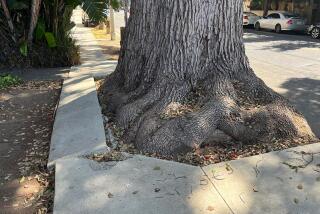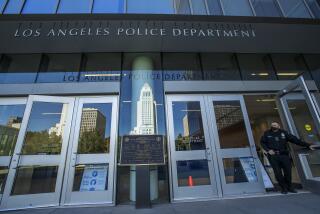Gridlock Comes to Committee
Mayor Tom Bradley’s anti-traffic congestion plan, stuck in the City Council, is a perfect illustration of how the new relationship between the mayor and increasingly independent council members will affect the lives of Los Angeles residents.
When the council’s Transportation and Traffic Committee was holding a hearing on the proposal at City Hall recently, new strains showed. It was early afternoon. Freeways were beginning to fill. Soon office workers would be trying to drive home, poking along downtown streets which, on good days, look like gridlock.
In the second-floor hearing room, Bill Bicker, the mayor’s traffic adviser, was stuck in a gridlock of his own, trying to steer the plan out of committee.
A look around the room would have warned Bicker that he was in for a difficult afternoon. Chairman Nate Holden, who had been mysteriously delaying this hearing, viewed Bicker with his usual scowl. Member Michael Woo, with a graduate degree in planning from the University of California, seemed skeptical; Councilman Zev Yaroslavsky, while not a member of the committee, was there to participate, perhaps as practice for his expected race against the mayor in 1989.
The Bradley plan, announced earlier this year, would have a substantial impact on residents and on people who commute to Los Angeles from surrounding communities.
Companies with 200 employees would have to develop ride-sharing programs. That would bring many smaller employers into the mandatory program previously authorized for firms with 700 or more employees. Although the plan is full of loopholes, it eventually would mean a substantial number of workers giving up their solitary commutes, swapping the luxury of listening to National Public Radio’s “Morning Edition” for the company of co-workers.
Truckers would be affected most of all. They would have to pay a significant fee for using city streets during peak hours and the city would lobby for similar state-imposed fees on freeways. The money would finance a rapid deployment cleanup force to clear away freeway spills and crashes involving trucks.
The plan has other features but as the hearing stretched into rush hour, truck fees and ride-sharing were the most controversial.
The third member of the committee, Councilman Marvin Braude, offered Bicker some hope. He called the Bradley plan necessary, while warning that “it takes a lot of political resolve to carry it out . . . it must be done and it would be better to do it comprehensively.”
Then, just as Bicker was taking comfort, Braude announced doubts about including smaller businesses in required ride-sharing. “Too far, too fast,” said the councilman, worrying that small businesses do not have the personnel required to set up ride-sharing. Woo agreed.
The truck fees were in other trouble. An official of the city Department of Transportation, Alice Lepis, expressed doubts about the goal of getting trucks off the streets during rush hours and having them make deliveries during less-crowded times, such as evening. She said residents could be upset by the sound of it: “Noise is the major issue people complain about.” The observation surprised Bicker. He has been besieged by complaints--and polls--citing traffic as a much greater concern.
Yaroslavsky called the truck fees “a disaster, ill-advised and flawed,” saying “the big guys can afford it, the little guys will suffer.” That was no surprise. Bicker and other administration aides expect Yaroslavsky criticism of any Bradley proposal in traffic, growth or planning areas. More significant was the attitude of Holden.
Holden beat Bradley’s choice in this year’s election. Now the councilman, neither forgiving nor forgetting, remembers friends and foes from that contest. Unlike the two other committee members, Holden did not offer criticism of substance. Instead he asked Bicker if he had talked to “the trucking association.” While Bicker said that he had talked to many groups, Holden insisted on discussion with organized truckers.
Holden served briefly as a state senator, but even a short Sacramento stay taught him the importance of such trade groups; they dominate the Capitol’s political marketplace through purchases of tables at fund-raising dinners and intensive lobbying. Holden seemed to be making clear that the trucking industry would be a player in this game.
At the end of the session, Bicker was most accommodating. What the Bradley program needed, he said, “was a good public hearing to thrash it out.” Yes, trucking industry.
Eventually, a traffic-control plan will pass. Bradley has always compromised with the council. But he has usually done so privately, with a settlement announced in a consensus press conference. The committee meeting demonstrated that those days ended with the last election, including the defeat of former Council President Pat Russell, a Bradley ally. Now council members, wanting a share of the spotlight and power, are fighting the mayor in public. Compromises will be more public--and painful--although the results, sharpened in open political debate, may be better.
More to Read
Sign up for Essential California
The most important California stories and recommendations in your inbox every morning.
You may occasionally receive promotional content from the Los Angeles Times.










